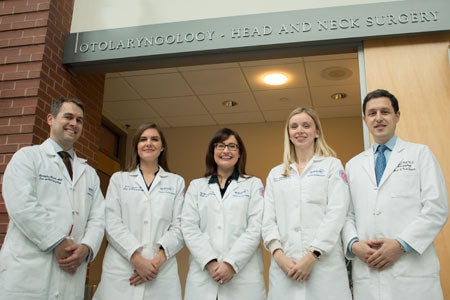It can be difficult for individuals to tell if they are suffering from allergies or have a more serious condition like chronic sinusitis. At Boston Medical Center, the physicians who care for these conditions work with each patient individually to come up with a diagnosis and a treatment plan.
Chronic Sinusitis
Chronic rhinosinusitis, or sinusitis, is a common medical condition affecting about 10-15% of people. Symptoms of sinusitis include:
- headaches
- facial pain
- dental pain
- bad smell in the nose
- nasal blockage and or nasal drainage
- fatigue
- reduced sense of smell
Diagnosing Chronic Sinusitis

To determine if a patient has chronic sinusitis, the doctor will conduct a physical exam and ask about symptoms. An X-Ray or CT scans will also be done to look inside the sinuses. In addition, the doctor might look inside the patient’s nose with a small camera for signs of disease that can’t be seen from the outside.
Treating Chronic Sinusitis
Treatment of sinusitis often requires multiple different medications. Depending on what the doctor finds, this may include nasal sprays, antibiotics, steroids, or salt water rinses. Sometimes, severe cases may benefit from surgery to open their sinuses and allow them to drain properly.
Allergic Rhinitis (also known as Hay Fever or Allergies)
Similarly to chronic sinusitis, allergic rhinitis is a common medical condition. It affects about 30% people. Symptoms include:
- sneezing
- rashes
- puffy eyes
- watery eyes
- nasal blockage
- nasal drainage
- throat clearing
- voice and swallowing difficulty
- fatigue
- decreased sense of smell
Diagnosing Allergic Rhinitis
Allergic rhinitis is diagnosed by a combination of symptoms and examination findings. The doctor may also wish to perform allergy testing with a scratch test or blood draw.
Treating Allergic Rhinitis
Treatment of allergy is done on a patient to patient basis. This may involve nasal sprays, and allergy medications, methods for avoiding exposure, and allergy shots or allergy drops. Allergy shots and drops involves giving patients small amounts of what they are allergic to and building it up over time until they no longer have symptoms from exposure.
Contact Us
Nose, Sinus, and Allergy Care
Monday - Friday 7:30 AM - 5:00 PM
Specialty Clinics
Otolaryngology – Ear, Nose and Throat Surgery
Pediatrics - Allergy
Pulmonology
Our Team
Allergists
Michael P. Platt, MD, MSc


Susan Greiver, NP
Jessica Lizotte Overlan, NP
Jennifer Lauver, RN
Patient Resources
Research Overview
Nose, Sinus, and Allergy Care Research
The physicians and staff of the BMC’s rhinology clinic are also affiliated with the Boston University Chobanian & Avedisian School of Medicine. They are actively involved in research involving diagnosis, treatment, and outcome research in chronic sinusitis, allergic rhinitis, and skull base surgery. If you are interested, ask if you might be eligible to participate in our ongoing research.
 en
en 

 Français
Français Deutsch
Deutsch Italiano
Italiano Español
Español Tiếng Việt
Tiếng Việt Kreyol ayisyen
Kreyol ayisyen